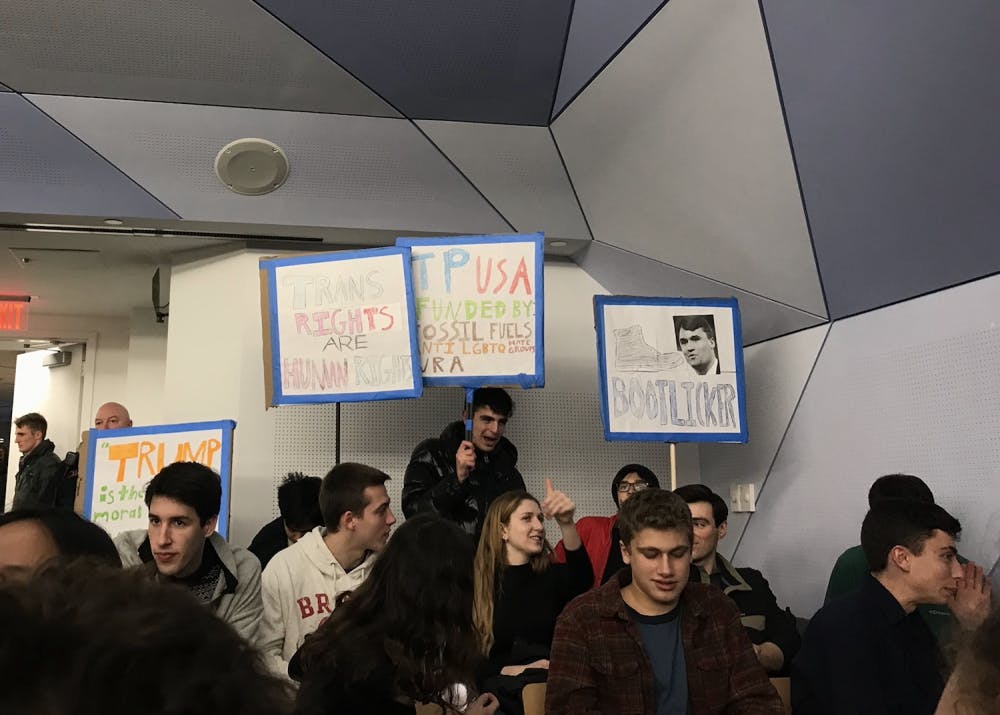In a contentious night of debate between Turning Point USA founder Charlie Kirk and University students, Kirk spoke for over an hour on Wednesday about his conservative viewpoints.
“This is what it’s all about,” Kirk told a packed auditorium in 85 Waterman St. at the beginning of his evening at the University. “Free flow of conversation.”
Kirk, who is a noted ally of President Trump, said that his visit to the University marked his first appearance at an Ivy League school.
The event, titled “An Evening with Charlie Kirk,” was co-hosted by the University’s chapter of TPUSA and Brown Republicans, said Christian Diaz de Leon ’21, president of TPUSA Brown. Through grants and national funding, TPUSA covered all of the expenses associated with the event, said Julian Haag ’20, Brown Republicans president and TPUSA outreach director.
Haag jumped at the opportunity to be involved in bringing Kirk to campus, he added, given that Kirk’s ideology aligns with the mainstream Republican Party rather than with “Never-Trumpers.”
“I’m not going to go out of my way to pick a speaker who’s more palatable to other members on campus. I don’t want to dance on eggshells and bring Jeb Bush to campus,” Haag added.
Jeb Bush came to campus spring 2018 to deliver the University’s 87th Stephen A. Ogden Jr. ’60 Memorial Lecture.
A handful of protesters holding signs outside of 85 Waterman St. greeted attendees as they entered the building for the event. Officers from both the University Department of Public Safety and the Providence Police Department were present, as well as Kirk’s personal security.
In determining its security protocol, the University considered protests that occurred when Kirk spoke at other universities previously, said Brian Clark, assistant vice president for news and editorial development at the University.
Earlier this week, signs denouncing Kirk circulated around campus, some calling Kirk a “racist grifter.”
Kirk began the event by acknowledging the cluster of protesters holding up posters — one of which read “Trans rights are human rights” — in the back row of the full auditorium, which holds about 200 people. Kirk immediately challenged the sign, criticizing transgender women for undermining competition with cisgender women in sports.
Throughout the night, Kirk repeatedly referred to transgender women as "men who think they are women," while generally decrying progressive policies and views.
Kirk also praised Trump’s actions in office, asking the crowd to have an “honest conversation about the results in this presidency.” He cited the “lowest Black unemployment rate” in history, in addition to railing against impeachment proceedings and the report produced by former Special Counsel Robert Mueller, before touting the proposed wall on the U.S.-Mexico border and questioning the economic value of a four-year college degree today.
Throughout his opening remarks, Kirk was met with cheers — from a small section of student supporters in the front of the room — as well as jabs and laughter from other parts of the audience.
The question-and-answer session featured terse interactions between Kirk and University students on topics including systemic racism, climate change, Trump’s impeachment proceedings and gay rights.
Every student who asked a question, save one, challenged Kirk on his viewpoints. Students shouted over Kirk while he often interrupted the students asking questions, responding without allowing them to finish speaking.
At one point, Kirk used a question about vaccines and belief in the scientific process to pivot to criticism of abortion. Later, he diverted a question about Turning Point’s funders into a discussion of a Supreme Court case Masterpiece Cakeshop v. Colorado Civil Rights Commission, which examined the right of a business to refuse service to a gay couple on the grounds of religious freedom.
The discussion of transgender rights also continued during the Q-and-A session, as several students looped back to Kirk’s initial statements on transgender individuals competing in sports.
Myung Joo Lee ’22 spoke to Kirk in the Q-and-A session about her view that sex exists on a spectrum, referencing how a person’s sex is defined by more than their specific chromosomes. Although Lee hoped to have a “more intellectual conversation” with Kirk, she said Kirk’s constant interjections and attempts to provoke her made their discussion unproductive.
Lee also felt that the event’s public platform contributed to the lack of meaningful dialogue between Kirk and the audience members. “In an ideal world I would have loved to have a discussion with him. I would love to actually talk with him about why he believes the things he does in a way that isn’t reliant on an audience reacting to it.”
Kirk was not made available for comment by press time.
Haag mentioned the possibility of bringing another conservative speaker, such as Ben Shapiro or Candace Owens, to campus in the spring.
TPUSA Brown previously tried to bring Owens to the University, though the event was cancelled due to a scheduling conflict, Haag said.
Conservatives at the University “want Ben Shapiro, Charlie Kirk, Candace Owens, because that’s what’s happening within the conservative movement,” Haag said. “For students who think this is just a moment for us to trigger the left, it’s really not. I want to hear Charlie Kirk myself — this is not for them.”
“If the roles were reversed,” he added, “I wouldn’t go listen to a speaker I was absolutely not in favor of,” Haag said.
Clark said that the University encourages event organizers to ensure that students can engage with speakers in a Q-and-A format, which offers the opportunity for those whose viewpoints don’t “align with that of the speaker” to discuss their differing ideas.
Clark also emphasized the importance of opening up the campus to a wide range of ideologies.
“All members of the Brown community have the right to invite speakers to campus, extended equally,” he said. “Brown must be a place that supports the free exchange of ideas, even when that means making space for ideas that are challenging or controversial. We have a high threshold for discomfort.”

ADVERTISEMENT




